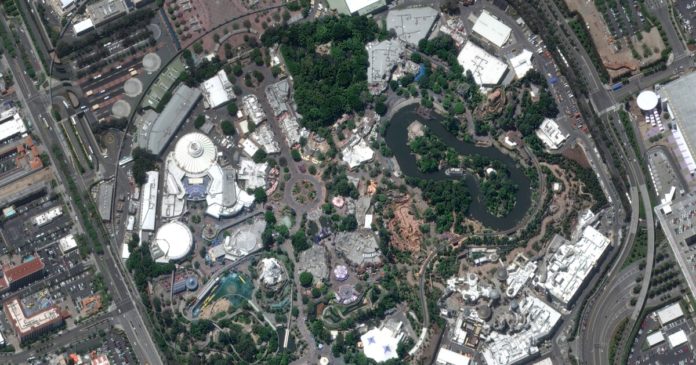
A new House bill seeks to revoke federally authorized “no-fly zones” over Walt Disney Co. theme parks in the United States, including Disneyland in Anaheim.
Rep. Troy Nehls (R-Texas) introduced the bill Monday with six GOP co-sponsors. including Doug LaMalfa of Northern California and Lauren Boebert of Colorado.
The legislation, House Resolution 8042, would direct Transportation Secretary Pete Buttigieg to rescind Federal Aviation Administration “notices to airmen,” or NOTAMs, that have forbidden flights over Disney theme parks since 2003.
In May, Nehls accused Buttigieg and House Speaker Nancy Pelosi (D-San Francisco) of “blatant favoritism towards the Walt Disney Company” and sent letters urging them to reconsider the no-fly zones over the parks, which he said are the only such parks to benefit from the restriction.
“The principle of fairness requires that the federal government does not favor one organization over another, or thereover, enact flight restrictions to benefit one favored organization,” Nehls wrote in the letter. He said the company uses the restrictions for the purposes of “eliminating banner ads and disruptive aircrafts from their parks.”
The bill also marks the GOP’s latest attempt to undermine Disney after the corporation vowed opposition to Florida Gov. Ron DeSantis’ so-called Don’t Say Gay bill, said Aubrey Jewett, a political science professor at the University of Central Florida. That bill forbids instruction on sexual orientation and gender identity in kindergarten through third grade.
“It may not be the only reason, but I think certainly it is the main reason that this Republican congressman from Texas is bringing it up now,” Jewett said. “It’s not like something has changed dramatically in terms of security, other than Disney has spoken out against a conservative bill here in Florida.”
Representatives for Disney did not immediately respond to a request for comment.
In his letter, Nehls said the no-fly designation is a restriction of freedom and should be reserved for matters of national security.
“Measures designed for protecting our national security and public safety must not be co-opted by companies looking to gain,” he said.
Jewett said Disney’s no-fly zone was granted in the wake of 9/11, when it was “not unreasonable” to think the “Happiest Place on Earth” could be a target for attack. However, he also noted that an Orlando Sentinel investigation in 2003 found that the protections had been pushed through by at least one Disney lobbyist.
Though the rules may be worth revisiting as they approach the 20-year mark, Jewett said the latest move seems to be less about security concerns and more about “doing something tangible to go after Disney.”
“Given that now it seems to be sort of a litmus test of ‘do you support the Don’t Say Gay bill,’ I don’t really see it moving forward while Democrats are in charge of the House,” he added.








